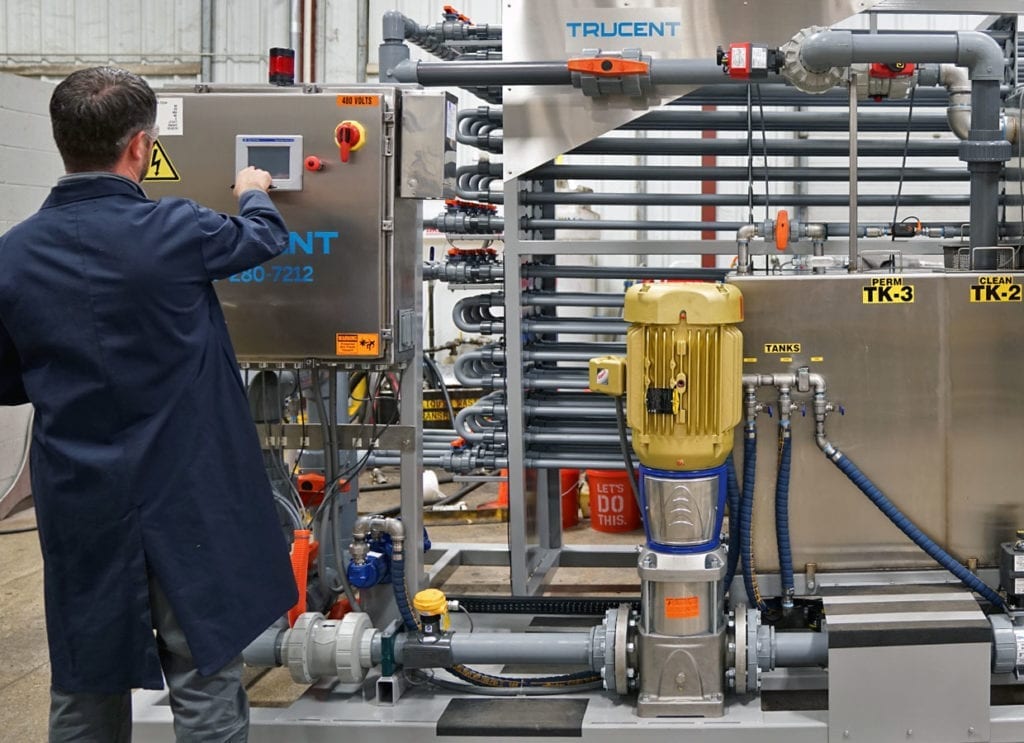Industrial Waste Water Treatment-- Cutting-Edge Technologies for Water Filtration
Industrial Waste Water Treatment-- Cutting-Edge Technologies for Water Filtration
Blog Article
Advancements and Developments in Industrial Waste Water Therapy Technologies
The landscape of industrial wastewater therapy is undergoing a transformative shift, driven by technologies that improve both performance and sustainability. As governing criteria progress, the integration of AI and device learning right into wastewater monitoring systems promises to simplify operations and guarantee compliance.
Overview of Drainage Treatment Technologies
Wastewater therapy innovations encompass a series of techniques designed to remove impurities from commercial effluents before their launch into the atmosphere. These innovations are essential for preserving ecological balance and ensuring compliance with environmental guidelines. The key categories of wastewater therapy consist of physical, chemical, and organic methods, each offering distinct functions based on the nature of the impurities present.

Organic therapy approaches employ microorganisms to break down raw material, making them particularly effective for organic-rich effluents. Methods like turned on sludge and biofilm activators harness the natural destruction abilities of germs, causing considerable decreases in biochemical oxygen demand (BOD)
Advanced Filtering Strategies
Advanced filtration methods represent a crucial development in the world of industrial wastewater treatment, boosting the efficiency of contaminant elimination procedures. Industrial Waste Water Treatment. These techniques encompass a range of innovations, including microfiltration, ultrafiltration, nanofiltration, and reverse osmosis, which offer consecutive obstacles for different fragment dimensions and chemical frameworks
Microfiltration and ultrafiltration make use of membrane systems to eliminate suspended solids, microorganisms, and larger natural molecules, boosting the high quality of effluent before more treatment. Nanofiltration bridges the space in between ultrafiltration and reverse osmosis, properly eliminating natural compounds and divalent ions, therefore minimizing the lots on downstream procedures.
Reverse osmosis offers the greatest level of filtration by permitting just water and tiny molecules to pass with its semi-permeable membrane layers, making it excellent for redeeming high-quality water from industrial effluents. Recent innovations in membrane layer modern technology, including the advancement of even more fouling-resistant and sturdy materials, have significantly improved functional efficiency and minimized costs.
Including these advanced filtering techniques not just boosts the total treatment process however also adds to sustainability initiatives by allowing water reuse and source healing in industrial setups. (Industrial Waste Water Treatment)
Biological Treatment Innovations

In addition, the development of crafted organic systems, such as membrane layer bioreactors (MBRs), integrates biological therapy with sophisticated membrane purification. This combination enables for greater effluent quality and decreased footprint, making it appropriate for space-constrained commercial centers. Developments in genetically engineered bacteria have actually additionally arised, enhancing the biodegradation of particular contaminants, such as drugs and heavy steels, that are typically testing to eliminate.
Furthermore, the implementation of bioaugmentation strategies, where beneficial microorganisms are introduced to improve the existing biological treatment procedures, has revealed promising lead to boosting treatment efficiency. These innovations jointly represent a pattern in the direction of more efficient and lasting organic treatment techniques that can adapt to the developing complexities of commercial wastewater streams. As industries remain to prioritize environmental compliance, these biological developments will certainly play an essential role in wastewater monitoring.

Source Healing Approaches
In industrial setups, the integration of resource recuperation approaches has become significantly important for enhancing sustainability description and lessening waste. These methods concentrate on drawing out useful products and energy from wastewater streams, consequently changing prospective toxins right into recyclable resources.
One prominent technique is nutrient recuperation, where nitrogen and phosphorus, often existing in excess in wastewater, are captured and exchanged plant foods. This not only reduces environmental influences however also supplies a round economy option for farming applications. In addition, technologies such as anaerobic food digestion enable the conversion of natural waste into biogas, a renewable resource resource that can offset fossil fuel use in commercial operations.
Moreover, progressed filtration and membrane modern technologies help with the healing of commercial by-products such as metals and salts. These recovered materials can be reintegrated into manufacturing processes, minimizing the requirement for virgin resources.
Future Fads in Waste Water Administration
As sectors increasingly focus on sustainability, the future of wastewater management is established to go through considerable transformations. Technical improvements, such as man-made knowledge and maker learning, will certainly enable a lot more effective surveillance and administration of wastewater systems. These innovations can predict maintenance needs, maximize therapy processes, and boost decision-making, eventually minimizing operational prices and environmental influence.
Additionally, the integration of circular economic situation concepts will play a vital function in wastewater administration. Industries are expected to change in the direction of systems that not only deal with wastewater yet likewise recover valuable sources, such as nutrients, water, and power. This shift will decrease waste and advertise the reuse of materials, aligning with international sustainability objectives.
Emerging therapy methods, such as membrane bioreactors and progressed oxidation procedures, will better improve the effectiveness of wastewater therapy, enabling for better effluents appropriate for reuse. Additionally, governing frameworks are likely to progress, emphasizing more stringent requirements for wastewater discharge and encouraging markets to adopt cutting-edge treatment remedies.
Final Thought
In final thought, the advancement of industrial wastewater treatment innovations shows a substantial change towards enhanced effectiveness and sustainability (Industrial Waste Water Treatment). Advancements in innovative purification techniques, biological treatments, and resource recovery techniques highlight the market's dedication to ecological stewardship.
The landscape of commercial wastewater therapy is going through a transformative change, driven by innovations that enhance both efficiency and sustainability.Wastewater treatment technologies encompass a range of methods developed to eliminate pollutants from industrial effluents prior to their launch right into the setting.Harnessing the power of biological processes has actually led to substantial innovations in the therapy of commercial wastewater.In addition, the application of bioaugmentation approaches, where useful microorganisms are presented to improve the existing biological treatment procedures, has actually shown encouraging results go to my blog in boosting therapy performance. These technologies jointly represent a trend in the direction of more lasting and reliable organic therapy methodologies that can adjust to the advancing complexities of industrial wastewater streams.
Report this page